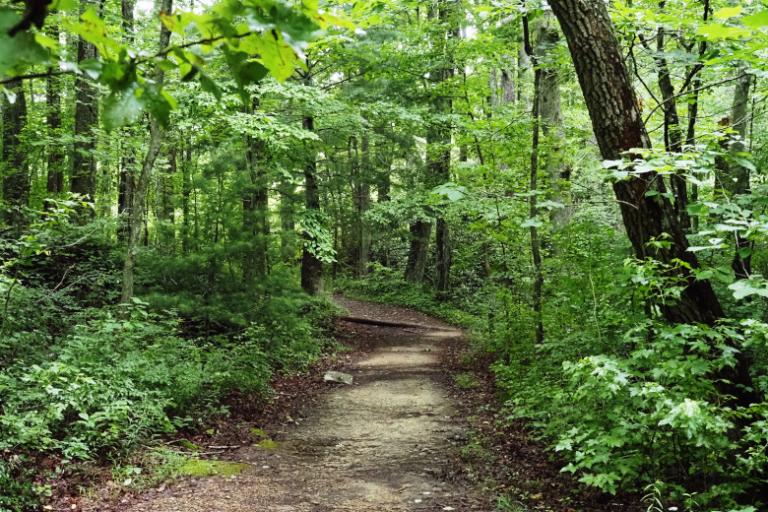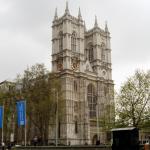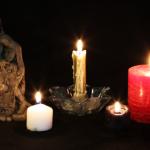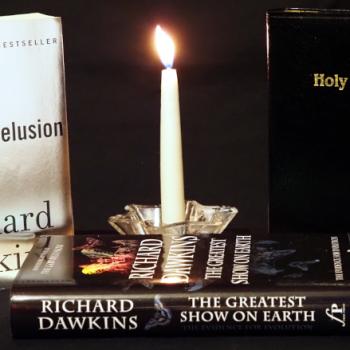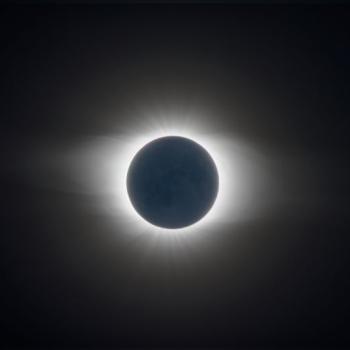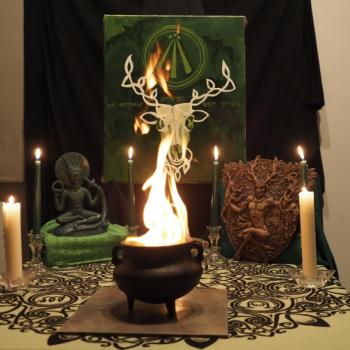Every so often I do Conversations Under the Oaks, where I take questions on anything and everything. This most recent edition began with a question that’s deep and relevant to more than just Pagans.
Many polls show the “Nones” to be the fastest growing group, but much of our American culture thinks that either you’re in “big organized religion” or you’re an atheist, and those are the only options. I wonder what it will take to recognize a less “black and white” scenario in mainstream culture.
The core problem is that for most Americans (and really, most Westerners), the only religion they have any exposure to is Christianity. They’re taught that Christianity is the “one true religion” and that it’s the right religion for everyone. They may recognize Judaism as a religion, but they view it through the lens of supersessionism – the idea that Christianity is the fulfillment of Judaism and therefore Jews should convert. That idea is highly offensive to Jews, and to many of the rest of us. Other religions are mostly ignored – we still occasionally see rightwing politicians arguing that Islam is not a religion, an idea that’s so blatantly false as to be ridiculous.
This core problem then extends to atheism. In his book The God Delusion, New Atheist Richard Dawkins argues against religion, but his definition of religion comes straight out of Christian fundamentalism. He went so far as to wear a t-shirt that said “Atheists For Jesus” because he appreciated the teachings of Jesus, while refusing to acknowledge the nontheistic-but-still-religious aspects of those teachings.
We don’t hear Paganism conflated with Satanism so much anymore, but it still happens occasionally. Some of this is the medieval idea that witches were “in league with the devil.” Most of it is that too many Americans assume that any religion other than their own must be rooted in the worship of their anti-god.
And so what we end up with is a three-headed taxonomy of religions all centered on Christianity. “Real religion” is what Christians believe, “false religion” is what other people believe, and “atheism” is people who don’t believe anything, or at least, anything sufficiently like Christianity.
This centering of Christianity is so pervasive that the Nones (as in “none of the above”) often call themselves “spiritual but not religious.” Many of them are quite religious, but “religion” is so connected to Christianity in general and fundamentalism in particular that they want no part of it.
The good news is that as Christianity continues to decline, those who aren’t completely indoctrinated (a group that includes Christians who are devoted to their religion but still accepting of those who follow other paths) will begin to understand that religion takes many forms, and will gradually learn a new, more inclusive, more universal definition of religion.
We can help with this in our conversations with ordinary people. We need not and should not proselytize, but we can help by decentering Christianity in our religious discussions. Here are some important concepts we need to understand and promote.
Religion is more than what you believe
The idea that religion is all about what you believe is a modern, Western, Protestant idea. For most people in most of the world for most of history, religion was and is about what you do, who you are, and whose you are. There is a place for belief in religion, but it’s not the most important thing, much less the only thing.
Religion is about how we live
What’s most important in life? Following a particular moral code? Doing no harm? Doing the most good? Helping others? Taking care of yourself and your family? What are our obligations to each other, and to the world at large?
We don’t need to tell other people what religion we follow. They can see for themselves by watching how we live our lives.
Religion doesn’t require a holy book
Revealed religions are usually based on books – that’s the only way they can spread beyond a tight geographic area. Organic religions arise from the lived experiences of a group of people in a particular place and time.
Many Pagans like to say “Nature is our holy book” – we learn from the trees, the mountains, the rivers, and all the animals that share the planet with us. We treasure the stories of our ancestors and we value the writing of other people on this path. But the source of our religion isn’t a book – it’s our own lived experiences, and the experiences of our co-religionists.
Religion is the collective wisdom of our ancestors
This is one of the things the Spiritual But Not Religious folks often miss. While each of us must find the path that calls to us, we don’t have to start from zero. Our ancestors – of blood and of spirit – built a foundation. We can start there and then go further than they ever imagined.
Religion is a living thing
Good religion is built on a foundation of the past, but it must speak to the needs and experiences of people here and now or it will fade into irrelevance. Or it will be propped up with coercion and force, but that’s another rant for another time.
Clinging to cultural norms and moral codes that may – or may not – have made sense centuries ago is no substitute for the hard work of re-examining core values and principles and figuring out how best to apply them in a world that is broader and deeper and has very different needs than in the past.
Religion is best practiced together
Our religious experiences are almost always an individual thing (though most of mine have happened in the context of a small group working). But the religions that flow from those experience are something we do together. Religion is our stories, our songs, our dances, our ceremonies. As my friend and fellow Denton Pagan leader Cynthia Talbot likes to say, “you can’t dance the Maypole by yourself.”
This is where the Nones will always struggle for recognition as a real religion (or as a spirituality, to use their preferred term) and not as a form of atheism. They don’t want to practice together, either because they were harmed in other (mostly Christian) groups, or they don’t want to make the commitment that group practice requires. Or they don’t have time for it, something Calvinist Christians (with their emphasis on work and their worship of capitalism) should consider, as their own numbers continue to decline.
Modern Paganism is growing as a solitary religion, and it has ever since the 1970s. As much I treasure my group practice, I’m doing my best to adapt my writing and teaching for those who do not have or do not want a local religious community. But that’s a challenge.
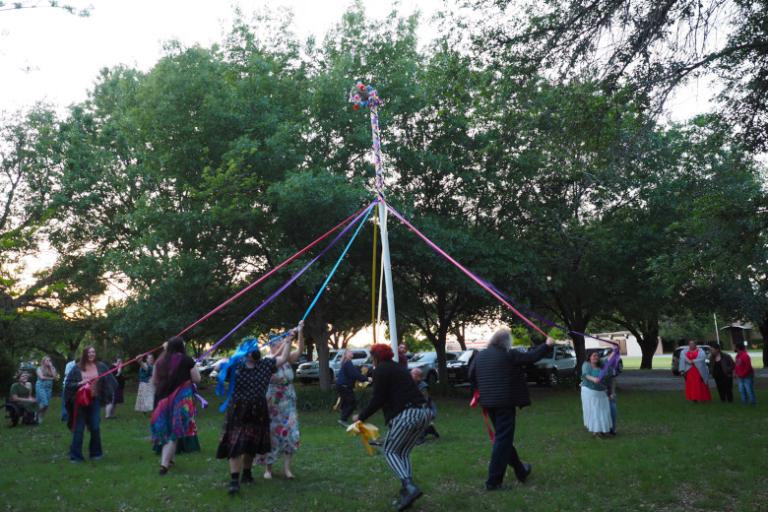
There are many religions and they don’t all look alike
This is the most religiously diverse society in the history of humanity. We need only look around our communities to find Muslims, Jews, Hindus, Buddhists, atheists, Pagans, and followers of other religions. Each of these religions deserves to be understood on its own terms, not just in terms of how it compares to the Protestant Christianity that still dominates the United States.
Old habits and old ways of thinking die hard. Decentering Christianity and instead centering a broad and inclusive understanding of religion will be a long-term project.
But to return to the original question, our wider society will recognize a less black and white scenario when it learns to see all the colors in the rainbow of religions.



